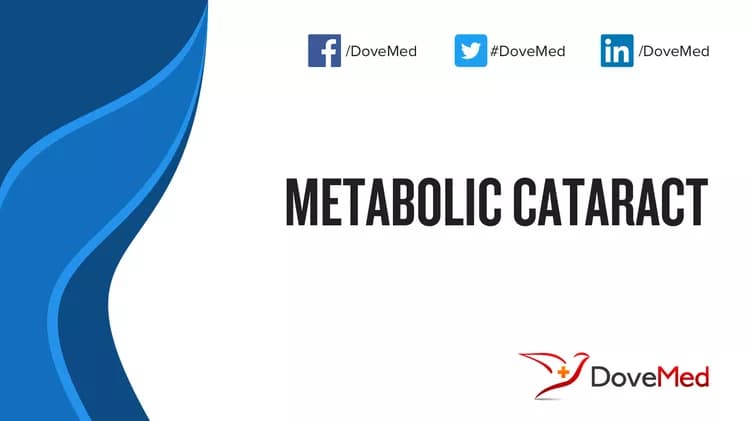What are the other Names for this Condition? (Also known as/Synonyms)
- Diabetic Cataract
- Sugar Cataract
What is Metabolic Cataract? (Definition/Background Information)
- Metabolic Cataract refers to the development of cataracts due to changes in the metabolism, often associated with systemic conditions such as diabetes mellitus (most commonly). It involves the clouding of the lens of the eye, leading to visual impairment
- Unlike age-related cataracts, which primarily affect older individuals, Metabolic Cataracts can occur at any age when there is a disruption in the body's metabolic processes. The signs and symptoms are similar to those of age-related cataracts and may include blurred or cloudy vision, sensitivity to glare, difficulty seeing in low-light conditions, and changes in color perception
- An eye specialist typically makes a diagnosis of Metabolic Cataract through a comprehensive eye examination. The underlying metabolic condition or disorder contributing to the cataract may also be assessed through medical tests and evaluations by other healthcare professionals
- The treatment of Metabolic Cataracts often involves addressing the underlying metabolic disorder or medical condition. In some cases, cataract surgery may be necessary to remove the cloudy lens and restore vision. The timing of surgery and the choice of intraocular lens (IOL) will depend on the individual's overall health and the severity of the cataract
- The prognosis for individuals with Metabolic Cataracts depends on the management of the underlying metabolic disorder and the success of cataract surgery if undertaken. With appropriate medical care and surgical intervention, many individuals can achieve improved vision and quality of life. However, the long-term outlook may vary depending on the specific metabolic condition and its management
Who gets Metabolic Cataract? (Age and Sex Distribution)
- Metabolic Cataracts primarily affect individuals with metabolic disorders, such as diabetes mellitus. The condition can occur in individuals of various age groups
- Both men and women are susceptible to developing the condition
- The condition is observed across all racial and ethnic groups worldwide
What are the Risk Factors for Metabolic Cataract? (Predisposing Factors)
The main risk factor for Metabolic Cataracts is the presence of metabolic disorders, particularly diabetes mellitus.
- Other metabolic conditions that can result in a Metabolic Cataract include galactosemia, myotonic dystrophy, and Wilson disease
- Other factors that increase the risk include poor blood sugar control, prolonged duration of diabetes, and certain genetic predispositions
It is important to note that having a risk factor does not mean that one will get the condition. A risk factor increases one’s chances of getting a condition compared to an individual without the risk factors. Some risk factors are more important than others.
Also, not having a risk factor does not mean that an individual will not get the condition. It is always important to discuss the effect of risk factors with your healthcare provider.
What are the Causes of Metabolic Cataract? (Etiology)
- Metabolic Cataract is a type of cataract that develops as a result of metabolic disorders or systemic medical conditions
- Elevated levels of glucose (sugar) in the blood, as seen in conditions like diabetes, can lead to changes in the lens proteins and fibers. These changes can disrupt the transparency of the lens, causing cataract formation
What are the Signs and Symptoms of Metabolic Cataract?
The signs and symptoms of Metabolic Cataracts are similar to those of other cataract types and may include the following:
- Blurred or hazy vision
- Increased sensitivity to light
- Difficulty seeing at night
- Changes in color perception
How is Metabolic Cataract Diagnosed?
The diagnosis of Metabolic Cataract may involve the following tests and exams:
- Physical examination and medical history evaluation; the presence of metabolic disorders, especially diabetes, is also considered during diagnosis
- Eye examination by an ophthalmologist is necessary for diagnosing Age-Related Cataracts
- Other tests performed by the healthcare provider may include:
- Slit-lamp biomicroscopy
- Dilated eye exam (dilated fundus examination)
- Visual acuity test
- Tonometry, to measure eye pressure
- Blood tests and imaging studies may be performed to evaluate the underlying metabolic condition
Many clinical conditions may have similar signs and symptoms. Your healthcare provider may perform additional tests to rule out other clinical conditions to arrive at a definitive diagnosis.
What are the possible Complications of Metabolic Cataract?
If left untreated, Metabolic Cataracts can significantly impact vision, leading to reduced quality of life. However, cataract surgery is a well-established treatment option that can restore clear vision.
How is Metabolic Cataract Treated?
Cataract surgery is the primary treatment for Metabolic Cataracts.
- During this procedure, the clouded lens is removed and replaced with an artificial intraocular lens (IOL)
- Good blood sugar control and management of the underlying metabolic disorder are also important
How can Metabolic Cataract be Prevented?
Effective management of metabolic disorders, especially diabetes, through lifestyle modifications, medication, and regular medical check-ups can help prevent or delay the development of Metabolic Cataracts in many cases.
What is the Prognosis of Metabolic Cataract? (Outcomes/Resolutions)
With timely diagnosis, appropriate treatment, and proper management of the underlying metabolic condition, the prognosis for Metabolic Cataracts is generally favorable. Cataract surgery can lead to improved vision and quality of life.
Additional and Relevant Useful Information for Age-Related Cataracts:
- Cataract is defined as opacification (to become opaque) or clouding of the natural clear lens that results in visual problems, including blindness
The following resource link may help in better understanding cataracts:
Related Articles
Test Your Knowledge
Asked by users
Related Centers
Related Specialties
Related Physicians
Related Procedures
Related Resources
Join DoveHubs
and connect with fellow professionals


0 Comments
Please log in to post a comment.